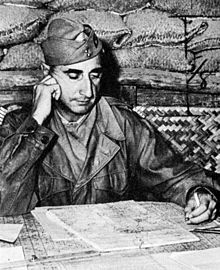Christian Marie de Castries

Christian Marie Comte de La Croix de Castries (born August 11, 1902 in Paris , † July 29, 1991 in Paris) was commander of the French troops in the battle of Điện Biên Phủ , the decisive battle in the First Indochina War between France and the Việt Minh .
Military career
De Castries went to the cavalry school of Saumur after graduating from school at the age of 19 . In 1926 he was promoted to officer , but soon left the army.
With the outbreak of World War II in 1939, de Castries returned to the army. In 1940 he was captured by the German Wehrmacht . In 1941 he managed to escape from a German prisoner of war camp . In the further course of the war he fought with the Free French troops in North Africa , Italy and southern France .
Towards the end of the war he was involved in the advance in southern Germany as a commandant in the 1st French Army under General Jean de Lattre de Tassigny in April 1945. His area of responsibility also included the extensive destruction of the unfortified Württemberg city of Freudenstadt by artillery fire .
In 1946 de Castries was promoted to lieutenant-colonel and transferred to Indochina . He was seriously wounded on a mission in Vietnam and spent a year in France to recover. After being promoted to colonel , he was transferred back to Vietnam.
De Castries became known worldwide as the commander of the French fortress Điện Biên Phủ in Vietnam. He and the Commander- in -Chief in Indochina , General Henri Navarre , underestimated the military and logistical capabilities of the people-supported Viet Minh under their Commander-in-Chief Võ Nguyên Giáp . The battle began on March 13, 1954 and ended on May 7 with a crushing defeat for the French. Of the 20,000 or so French soldiers , around 8,200 were dead or missing, and 1,600 deserted. Colonel de Castries was promoted to Général de brigade a few days before the surrender , although as a cavalry officer he had proven incapable of defensive warfare. He capitulated and was taken prisoner of war with around 10,300 men. Of these, only 3,290 survived. After a ceasefire agreement, de Castries was released from captivity after just four months.
In 1959 de Castries retired.
literature
- Peter Scholl-Latour : Death in the rice field .
- Peter Scholl-Latour: Colossus on feet of clay .
- Jules Roy: The Fall of Dien Bien Phu. The white man's Stalingrad in Indochina . Heyne, Munich 1964.
| personal data | |
|---|---|
| SURNAME | Castries, Christian Marie de |
| ALTERNATIVE NAMES | Castries, Christian Marie Fernand Comte de La Croix de |
| BRIEF DESCRIPTION | comes from an old French noble family |
| DATE OF BIRTH | August 11, 1902 |
| PLACE OF BIRTH | Paris |
| DATE OF DEATH | July 29, 1991 |
| Place of death | Paris |
